MBA Corporate Governance Report: Woolworths Good Business Journey
VerifiedAdded on 2023/03/17
|5
|1026
|72
Report
AI Summary
This report examines Woolworths' Good Business Journey, a sustainability initiative launched in 2007, analyzing its role in the company's corporate governance. The program addresses social, environmental, and economic risks by integrating sustainability into its operations. The report highlights the company's commitment to stakeholders, environmental sensitivity, and reduction of carbon footprint. It explores the sustainability index used as a strategic framework, with indicators focusing on transformation, skill development, and social development. The analysis covers Woolworths' efforts to reduce poverty, promote environmental-friendly farming, and minimize water consumption. The report also discusses how the program aims to reduce carbon emissions through energy efficiency and addresses climatic changes. Furthermore, it emphasizes the program's impact on operational efficiency, cost savings, and stakeholder engagement. The report concludes that the Good Business Journey has enhanced sustainability among internal and external stakeholders.
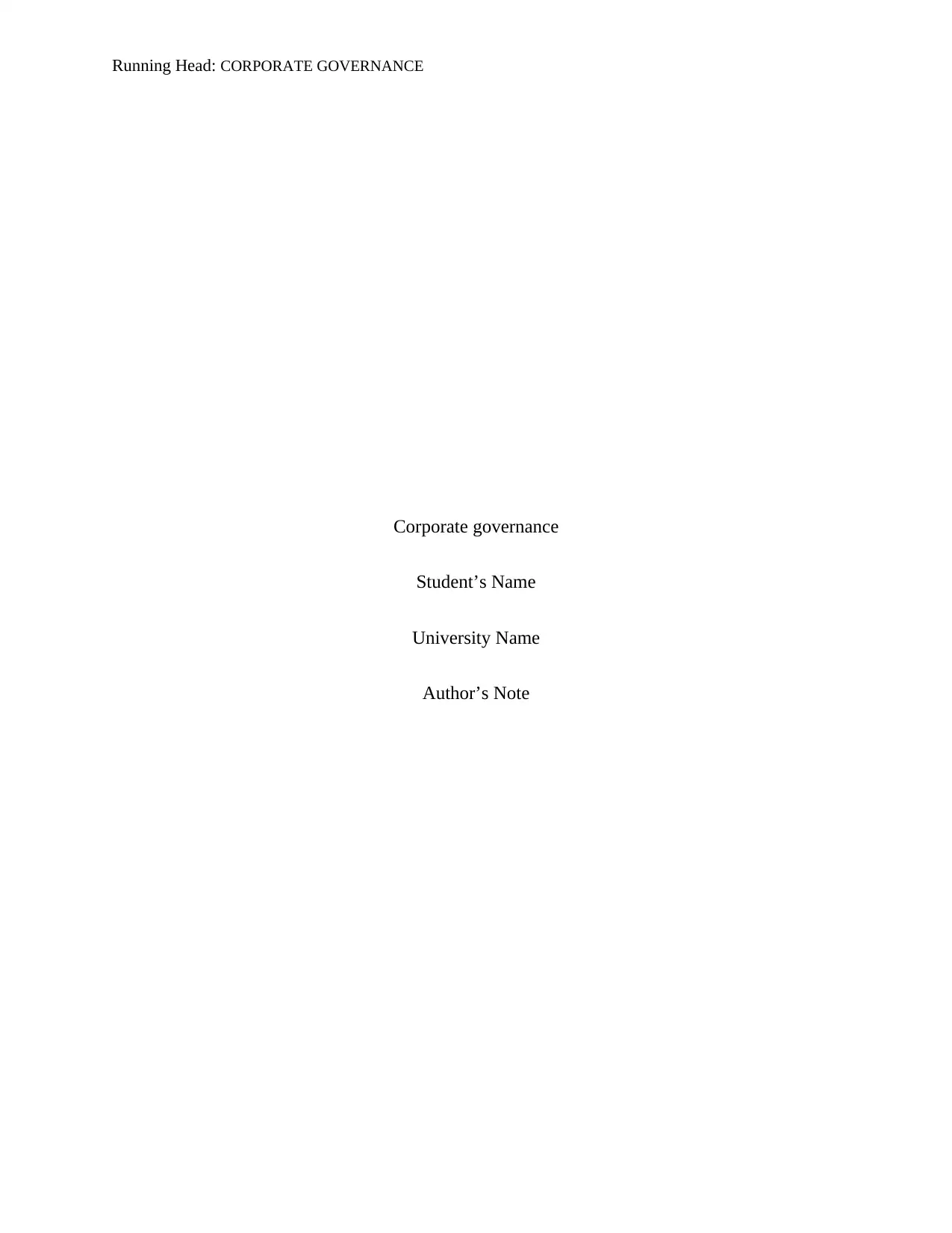
Running Head: CORPORATE GOVERNANCE
Corporate governance
Student’s Name
University Name
Author’s Note
Corporate governance
Student’s Name
University Name
Author’s Note
Paraphrase This Document
Need a fresh take? Get an instant paraphrase of this document with our AI Paraphraser
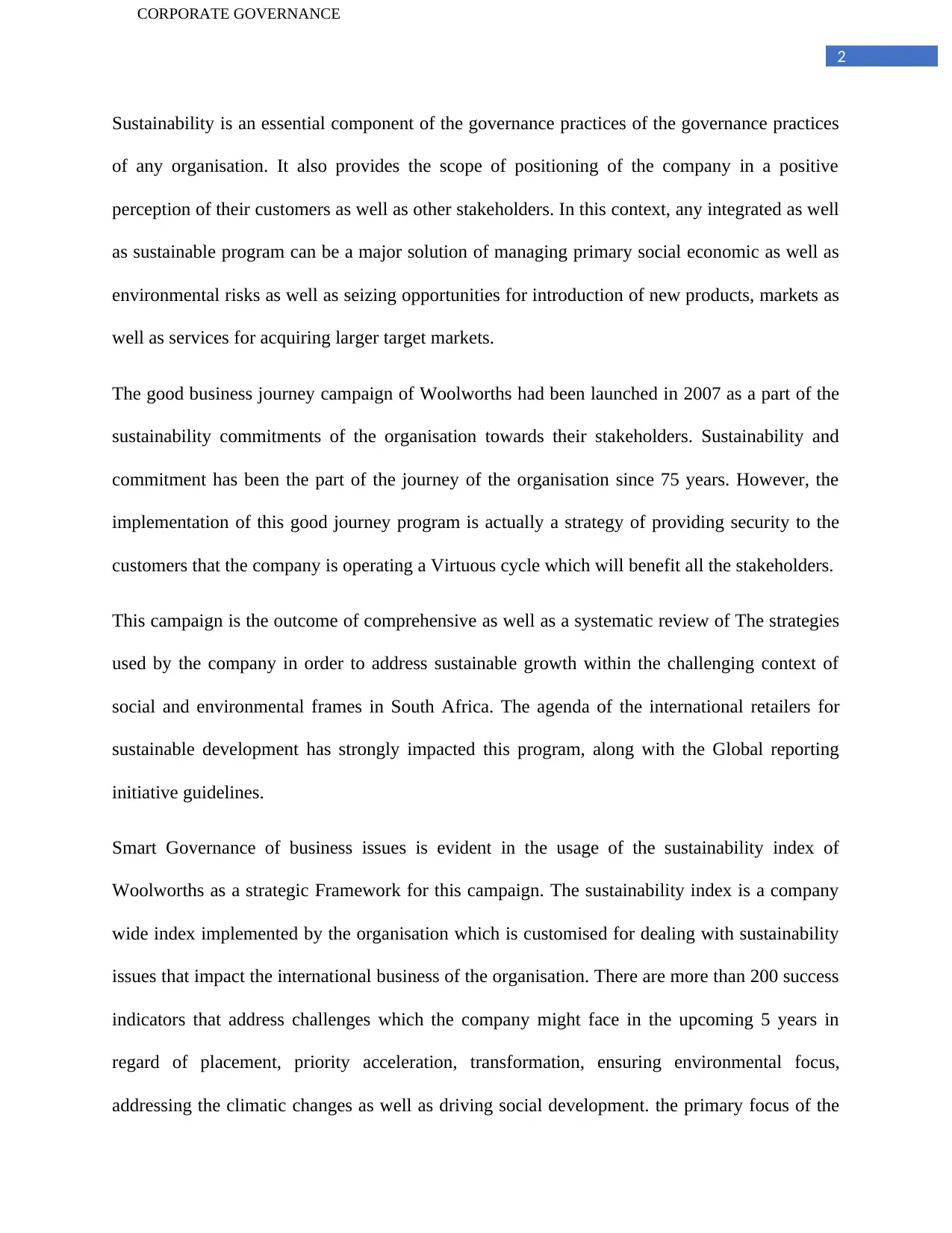
2
CORPORATE GOVERNANCE
Sustainability is an essential component of the governance practices of the governance practices
of any organisation. It also provides the scope of positioning of the company in a positive
perception of their customers as well as other stakeholders. In this context, any integrated as well
as sustainable program can be a major solution of managing primary social economic as well as
environmental risks as well as seizing opportunities for introduction of new products, markets as
well as services for acquiring larger target markets.
The good business journey campaign of Woolworths had been launched in 2007 as a part of the
sustainability commitments of the organisation towards their stakeholders. Sustainability and
commitment has been the part of the journey of the organisation since 75 years. However, the
implementation of this good journey program is actually a strategy of providing security to the
customers that the company is operating a Virtuous cycle which will benefit all the stakeholders.
This campaign is the outcome of comprehensive as well as a systematic review of The strategies
used by the company in order to address sustainable growth within the challenging context of
social and environmental frames in South Africa. The agenda of the international retailers for
sustainable development has strongly impacted this program, along with the Global reporting
initiative guidelines.
Smart Governance of business issues is evident in the usage of the sustainability index of
Woolworths as a strategic Framework for this campaign. The sustainability index is a company
wide index implemented by the organisation which is customised for dealing with sustainability
issues that impact the international business of the organisation. There are more than 200 success
indicators that address challenges which the company might face in the upcoming 5 years in
regard of placement, priority acceleration, transformation, ensuring environmental focus,
addressing the climatic changes as well as driving social development. the primary focus of the
CORPORATE GOVERNANCE
Sustainability is an essential component of the governance practices of the governance practices
of any organisation. It also provides the scope of positioning of the company in a positive
perception of their customers as well as other stakeholders. In this context, any integrated as well
as sustainable program can be a major solution of managing primary social economic as well as
environmental risks as well as seizing opportunities for introduction of new products, markets as
well as services for acquiring larger target markets.
The good business journey campaign of Woolworths had been launched in 2007 as a part of the
sustainability commitments of the organisation towards their stakeholders. Sustainability and
commitment has been the part of the journey of the organisation since 75 years. However, the
implementation of this good journey program is actually a strategy of providing security to the
customers that the company is operating a Virtuous cycle which will benefit all the stakeholders.
This campaign is the outcome of comprehensive as well as a systematic review of The strategies
used by the company in order to address sustainable growth within the challenging context of
social and environmental frames in South Africa. The agenda of the international retailers for
sustainable development has strongly impacted this program, along with the Global reporting
initiative guidelines.
Smart Governance of business issues is evident in the usage of the sustainability index of
Woolworths as a strategic Framework for this campaign. The sustainability index is a company
wide index implemented by the organisation which is customised for dealing with sustainability
issues that impact the international business of the organisation. There are more than 200 success
indicators that address challenges which the company might face in the upcoming 5 years in
regard of placement, priority acceleration, transformation, ensuring environmental focus,
addressing the climatic changes as well as driving social development. the primary focus of the
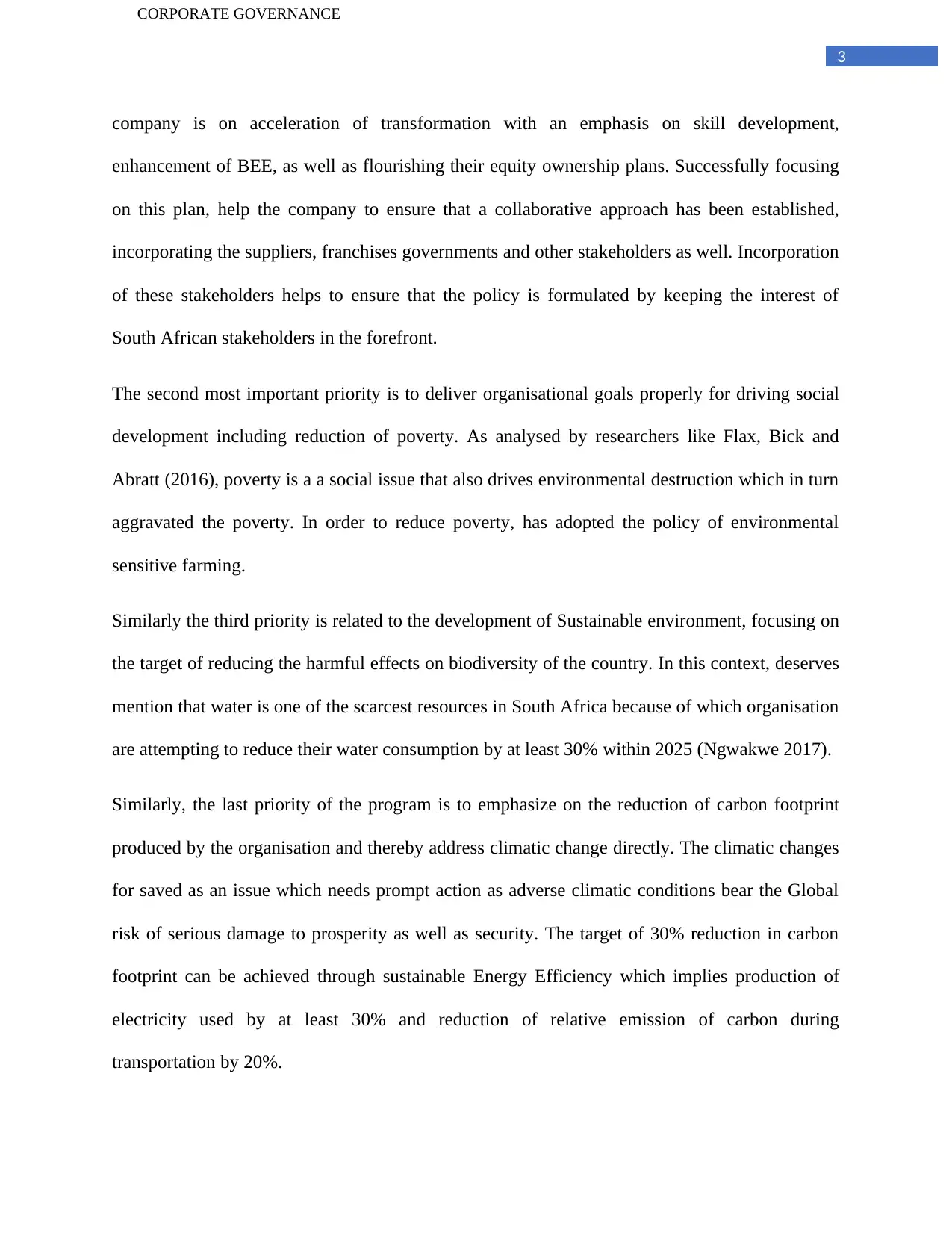
3
CORPORATE GOVERNANCE
company is on acceleration of transformation with an emphasis on skill development,
enhancement of BEE, as well as flourishing their equity ownership plans. Successfully focusing
on this plan, help the company to ensure that a collaborative approach has been established,
incorporating the suppliers, franchises governments and other stakeholders as well. Incorporation
of these stakeholders helps to ensure that the policy is formulated by keeping the interest of
South African stakeholders in the forefront.
The second most important priority is to deliver organisational goals properly for driving social
development including reduction of poverty. As analysed by researchers like Flax, Bick and
Abratt (2016), poverty is a a social issue that also drives environmental destruction which in turn
aggravated the poverty. In order to reduce poverty, has adopted the policy of environmental
sensitive farming.
Similarly the third priority is related to the development of Sustainable environment, focusing on
the target of reducing the harmful effects on biodiversity of the country. In this context, deserves
mention that water is one of the scarcest resources in South Africa because of which organisation
are attempting to reduce their water consumption by at least 30% within 2025 (Ngwakwe 2017).
Similarly, the last priority of the program is to emphasize on the reduction of carbon footprint
produced by the organisation and thereby address climatic change directly. The climatic changes
for saved as an issue which needs prompt action as adverse climatic conditions bear the Global
risk of serious damage to prosperity as well as security. The target of 30% reduction in carbon
footprint can be achieved through sustainable Energy Efficiency which implies production of
electricity used by at least 30% and reduction of relative emission of carbon during
transportation by 20%.
CORPORATE GOVERNANCE
company is on acceleration of transformation with an emphasis on skill development,
enhancement of BEE, as well as flourishing their equity ownership plans. Successfully focusing
on this plan, help the company to ensure that a collaborative approach has been established,
incorporating the suppliers, franchises governments and other stakeholders as well. Incorporation
of these stakeholders helps to ensure that the policy is formulated by keeping the interest of
South African stakeholders in the forefront.
The second most important priority is to deliver organisational goals properly for driving social
development including reduction of poverty. As analysed by researchers like Flax, Bick and
Abratt (2016), poverty is a a social issue that also drives environmental destruction which in turn
aggravated the poverty. In order to reduce poverty, has adopted the policy of environmental
sensitive farming.
Similarly the third priority is related to the development of Sustainable environment, focusing on
the target of reducing the harmful effects on biodiversity of the country. In this context, deserves
mention that water is one of the scarcest resources in South Africa because of which organisation
are attempting to reduce their water consumption by at least 30% within 2025 (Ngwakwe 2017).
Similarly, the last priority of the program is to emphasize on the reduction of carbon footprint
produced by the organisation and thereby address climatic change directly. The climatic changes
for saved as an issue which needs prompt action as adverse climatic conditions bear the Global
risk of serious damage to prosperity as well as security. The target of 30% reduction in carbon
footprint can be achieved through sustainable Energy Efficiency which implies production of
electricity used by at least 30% and reduction of relative emission of carbon during
transportation by 20%.
⊘ This is a preview!⊘
Do you want full access?
Subscribe today to unlock all pages.

Trusted by 1+ million students worldwide
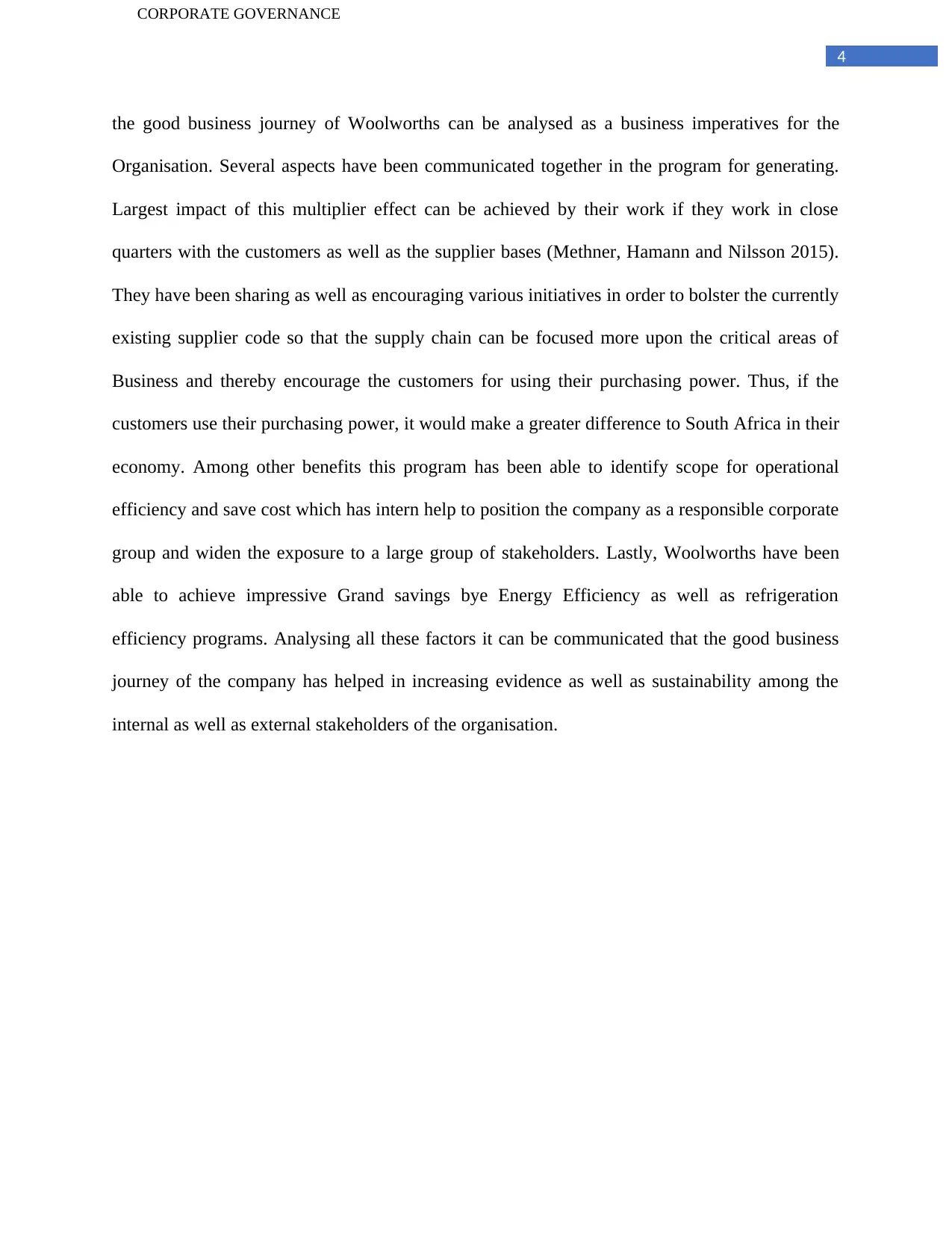
4
CORPORATE GOVERNANCE
the good business journey of Woolworths can be analysed as a business imperatives for the
Organisation. Several aspects have been communicated together in the program for generating.
Largest impact of this multiplier effect can be achieved by their work if they work in close
quarters with the customers as well as the supplier bases (Methner, Hamann and Nilsson 2015).
They have been sharing as well as encouraging various initiatives in order to bolster the currently
existing supplier code so that the supply chain can be focused more upon the critical areas of
Business and thereby encourage the customers for using their purchasing power. Thus, if the
customers use their purchasing power, it would make a greater difference to South Africa in their
economy. Among other benefits this program has been able to identify scope for operational
efficiency and save cost which has intern help to position the company as a responsible corporate
group and widen the exposure to a large group of stakeholders. Lastly, Woolworths have been
able to achieve impressive Grand savings bye Energy Efficiency as well as refrigeration
efficiency programs. Analysing all these factors it can be communicated that the good business
journey of the company has helped in increasing evidence as well as sustainability among the
internal as well as external stakeholders of the organisation.
CORPORATE GOVERNANCE
the good business journey of Woolworths can be analysed as a business imperatives for the
Organisation. Several aspects have been communicated together in the program for generating.
Largest impact of this multiplier effect can be achieved by their work if they work in close
quarters with the customers as well as the supplier bases (Methner, Hamann and Nilsson 2015).
They have been sharing as well as encouraging various initiatives in order to bolster the currently
existing supplier code so that the supply chain can be focused more upon the critical areas of
Business and thereby encourage the customers for using their purchasing power. Thus, if the
customers use their purchasing power, it would make a greater difference to South Africa in their
economy. Among other benefits this program has been able to identify scope for operational
efficiency and save cost which has intern help to position the company as a responsible corporate
group and widen the exposure to a large group of stakeholders. Lastly, Woolworths have been
able to achieve impressive Grand savings bye Energy Efficiency as well as refrigeration
efficiency programs. Analysing all these factors it can be communicated that the good business
journey of the company has helped in increasing evidence as well as sustainability among the
internal as well as external stakeholders of the organisation.
Paraphrase This Document
Need a fresh take? Get an instant paraphrase of this document with our AI Paraphraser
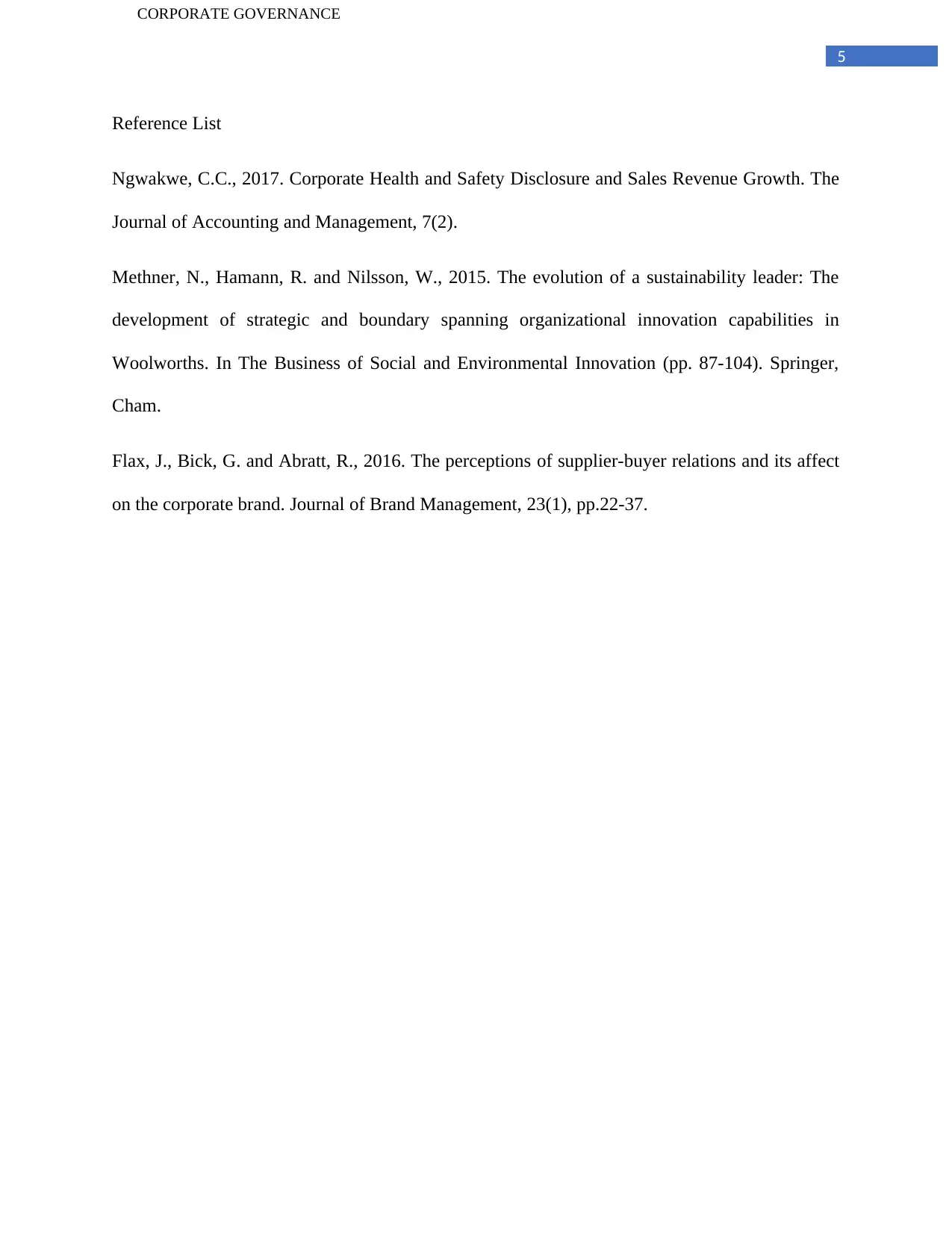
5
CORPORATE GOVERNANCE
Reference List
Ngwakwe, C.C., 2017. Corporate Health and Safety Disclosure and Sales Revenue Growth. The
Journal of Accounting and Management, 7(2).
Methner, N., Hamann, R. and Nilsson, W., 2015. The evolution of a sustainability leader: The
development of strategic and boundary spanning organizational innovation capabilities in
Woolworths. In The Business of Social and Environmental Innovation (pp. 87-104). Springer,
Cham.
Flax, J., Bick, G. and Abratt, R., 2016. The perceptions of supplier-buyer relations and its affect
on the corporate brand. Journal of Brand Management, 23(1), pp.22-37.
CORPORATE GOVERNANCE
Reference List
Ngwakwe, C.C., 2017. Corporate Health and Safety Disclosure and Sales Revenue Growth. The
Journal of Accounting and Management, 7(2).
Methner, N., Hamann, R. and Nilsson, W., 2015. The evolution of a sustainability leader: The
development of strategic and boundary spanning organizational innovation capabilities in
Woolworths. In The Business of Social and Environmental Innovation (pp. 87-104). Springer,
Cham.
Flax, J., Bick, G. and Abratt, R., 2016. The perceptions of supplier-buyer relations and its affect
on the corporate brand. Journal of Brand Management, 23(1), pp.22-37.
1 out of 5
Related Documents
Your All-in-One AI-Powered Toolkit for Academic Success.
+13062052269
info@desklib.com
Available 24*7 on WhatsApp / Email
![[object Object]](/_next/static/media/star-bottom.7253800d.svg)
Unlock your academic potential
Copyright © 2020–2026 A2Z Services. All Rights Reserved. Developed and managed by ZUCOL.




